T
urkish, Iranian and Syrian visitors dominated among attendees at ITM 2006, a textile
machinery exhibition organized by Teknik Fuarcilik ve Yayincilik Ltd. and held at the CNR
International Fair and Congress Center in Istanbul, Turkey. Some 400 Turkish technology
manufacturers and 800 international firms exhibited the latest in textile technology.
Traffic at the show increased with each passing day, and the six-day event concluded with
48,907 total registered guests. International visitors from 72 countries made up 16 percent of the
attendees, while 84 percent were from Turkey. Twenty-four percent of the international visitors
were from Iran, 21 percent from Syria and 8 percent from Egypt.
Exhibitors’ opinions ranged from “disappointed” to “extremely pleased,” with show traffic
building from a slow start. Recent Turkish lira fluctuations were cited by many as a threat and an
opportunity for the industry.
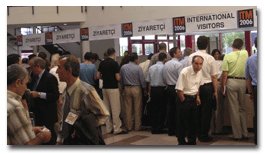
Changing Market
“Turkey is feeling pressure,” said Haluk Erbel of Istanbul-based Erbel Mümessillik, a service
company and representative of Switzerland-based Rieter Textile Systems since 1974. “Companies are
vertical — yarn to garment. Fashion changes once a month. You have to be creative and produce
quickly in the fashion sector — this is the future of Turkey. Today, our clients are more concerned
with quality. It used to be quantity, but now it is higher and higher quality. China’s exports were
large [affecting Turkey] because the Turkish lira was strong. Just in the past several weeks, the
Turkish lira has fallen 20 to 24 percent in value. So this has changed things.
“Textiles are the main industry in Turkey,” Erbel said. “With Rieter, we offer a full range
of equipment from bale opening through spinning. There is a growing awareness of compact yarn and
its advantages. We have good technology, and we can provide turnkey operations with full support —
from installation forward.”
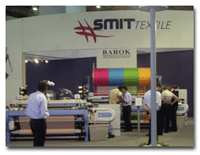
Italy-based Savio Macchine Tessili S.p.A. also has recognized the challenges the region faces
and sees premium compact yarn, fine-count yarn and specials like compact with Lycra® as a possible
solution. Mauro Rizzo, area sales manager, Savio; and Selim L. Sarfati, Turkey-based Alfredo
Modiano — Savio’s representative in Turkey, spoke of Savio’s expertise supplying automatic winders
with computer-aided package technology. “Orion winders produce a quality package — a quality
package necessary for quality yarns,” he said. Savio highlighted a list of field installations
throughout the region that are manufacturing compact yarns and using Savio winding technology.
Pablo Canora, sales director, textiles, Switzerland-based Santex Group, said the company had
good results and saw clients from Egypt, Iran and Syria. “The Turkish region and Uzbekistan have
been present,” Canora said. “The business is stable, but I hope with the change in the exchange
rate, that this will be a relief for Turkish exporters and a signal that something is happening for
Turkey. This will also help our clients continue to invest in the industry.”
Massimo Soffriti, general manager, Italy-based Loptex S.r.l., agreed the Turkish market is
changing. “Turkey is turning more toward quality,” he said. “If the process needs higher quality,
we have a place in this market. We may not see big new installations, but rather replacement of
older machines or upgrading for quality.”
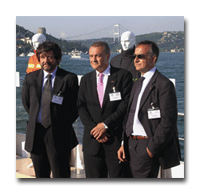
Banfi; and ACIMIT Director Dott. Federico Pellegata
Germany-based Trützschler GmbH & Co. KG drew interest with its TC 03 card and TD 03 draw
frame. The company reported being quite satisfied with the show and had serious discussions with
Turkish, Syrian and Iranian customers.
Switzerland-based Stäubli AG introduced two new electronic jacquard machines, the LX 1602 and
LX 3202. Both models are designed for weaving flat and terry fabrics at high speeds and were
developed from predecessor machines LX 1600 and LX 3201.
According to the company, depending on the format chosen, the LX 1602 and LX 3202 deliver up
to 30-percent greater load capacity and approximately 10-percent greater maximum speed. The new
models feature the M6 module for driving the hooks. The new machines are built on a reinforced
chassis and have undergone several mechanical optimizations to absorb the higher load and improve
reliability, as well as minimize maintenance. The overhead space requirement and machine width have
been reduced.
The LX 1602 is available in a format range of 1,408 to 5,120 hooks; and the LX 3202, in a
range from 6,144 to 14,336 hooks. Both machines are controlled by the color-touch-screen-equipped
jacquard controller type JC6.
“Turkey is a main market, and it fluctuates,” said Eduard Strebel, manager, marketing
services, Switzerland-based Jakob Müller AG, Frick. “We have continuity in Turkey, with
relationships with many companies. They use very modern technology. The exchange rate has made
machines expensive. With the Turkish interest in lace, our 24-bar MDR 42 knitting machine is very
strong in this market.”
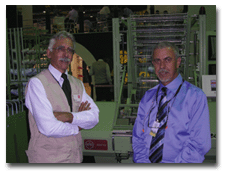
Istanbul-based representative Bilol Tekstil
Italy-based Itema Weaving featured Somet and Vamatex weaving machines. “The up-to-date
technology is here and is more about versatility than mass production,” said PierMarco Arnoldi,
commercial and technical manager, sales department. “This means increasing the quality of
production. Jacquard sales have improved. The new Silver Dyno Terry is on display here for the
first time. The main interests of Turkish clients are the rapier Silver and Alpha. The market is
stable and is moving from dobby to jacquard, just as it used to compete with Asia and now competes
with Europe. Turkish clients are very knowledgeable and continue to invest in up-to-date
technology.”
Fritz Legler, vice president and head of technical service at Switzerland-based Sultex Ltd.,
a member of Itema Weaving, spoke of the interest in special applications. “Turkish denim producers
are interested in double-wide projectile machines,” Legler said. “Over the last 12 months, we have
delivered several P7300 HPs for denim, with one installation in excess of 400 machines, and clearly
outrunning air jet in this field of application. It is also interesting to see the market accept
and develop technical products.”
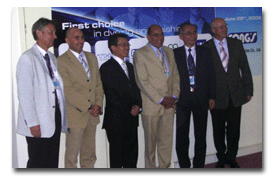
representative, Sarteks Tekstil.
“Last year was a panic for Turkey because of China, but now we see confidence,” said Erwin
Devloo, marketing communications manager, Picanol NV, Belgium. “We have seen technical textiles
establish a foothold, and emerging businesses are important at fairs like this one. We believe in
Turkey, and it is one of the main markets along with China, India, Pakistan and Brazil. Together
they are 80 percent of the market in numbers of machines,” Devloo continued. “As for the show,
first-day problems with air conditioning and power were solved quickly, and the rest has been very
professional. You don’t have a lot of red tape to get things done.”
Michele Zampieri of the technology department of Italy-based Cimi S.p.A. explained the
changes available in dyeing and finishing technology. “We are here to explain to the market the
move in recent years to be both economical and environmentally friendly,” he said. “Over the past
five years we have reduced water consumption by 50 percent, chemical consumption by 50 percent,
power consumption by 50 percent; and reduced the space necessary for the machine by 30 percent.
“We have also made the machinery versatile — from wool processing to cotton and synthetics,”
Zampieri said.
September/October 2006




